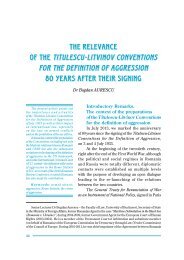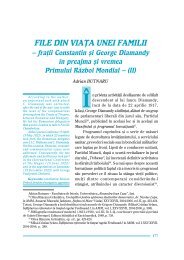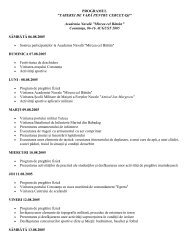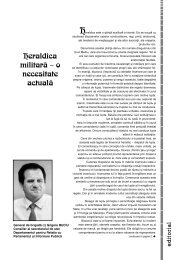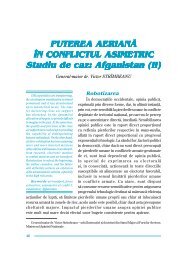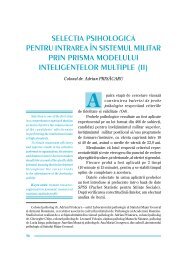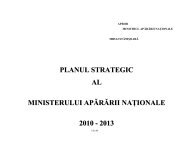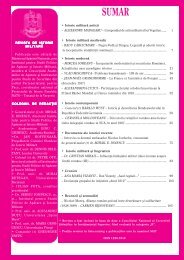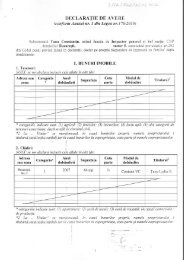Create successful ePaper yourself
Turn your PDF publications into a flip-book with our unique Google optimized e-Paper software.
status of the Straits. Initial views were completely<br />
contradictory. Soviet Union wished to close the<br />
Straits for its own security, although the Treaty of<br />
Moscow (16 March 1921) had already recognised<br />
the Turkish sovereignty under the condition of<br />
free navigation of merchant ships. Britain wanted<br />
the opposite, i.e. to remain open so as their fleet<br />
could sail through Euxeinos. Finally, the British<br />
proposals prevailed with certain restrictions. The<br />
principle of freedom of transit and navigation by<br />
<strong>sea</strong> and air, at Hellespont, Propontis and Bosporus<br />
was recognised under certain conditions. 13<br />
To secure a satisfactory operation of the status<br />
of the Straits, the Treaty demilitarized the regions<br />
around Bosporus and Hellespont including<br />
the islands at the entrance of the Straits - Imbros,<br />
Tenedos, Mavries, Lemnos and Samothrace. 14 An<br />
international Commission was also formed under<br />
the supervision of the League of Nations with representatives<br />
from England, France, Italy, Japan,<br />
Greece, Bulgaria, Serb-Croat-Slovene State, Russia<br />
and Romania headed by Turkey. Demilitarization<br />
regime didn’t really affect Greece as it referred<br />
only to two Greek islands, Lemnos and<br />
Samothrace, as opposed to Turkey. Apart from this,<br />
Turkey did not like the Lausanne status of the<br />
Straits for various reasons. It tried to undermine<br />
with all means, transit ships and created serious<br />
problems by abusing its rights and blocking free<br />
navigation of the Straits. 15 It was anxious to find<br />
the right moment to replace it and managed to<br />
supersede it in 1936 with the Montreux Convention.<br />
The Turkish Government invoking rebus sic<br />
stantibus (total change of circumstances) considered<br />
that the Treaty of Lausanne was out-of-date<br />
and called the High Contracting Parties to review<br />
it. 16 International conjunctions assisted this success<br />
as Turkey joined the League of Nations in<br />
1932, Germany denounced the military provisions<br />
of the Treaty of Versailles, Italy was absent from<br />
the Conference of Montreux due to its attack to<br />
Ethiopia, Soviet Union supported with its great<br />
power Turkey and England tried to win Turkey<br />
over so as to have it as an ally in case of war in the<br />
Mediterranean.<br />
According to the provisions of the Montreux<br />
Convention of 1936 the Sea of Marmara and the<br />
Bosporus enjoy complete freedom of transit and<br />
navigation. The Convention has 29 articles, 4 an-<br />
����� Review of Military History �����<br />
nexes and one protocol, 17 and represents the triumph<br />
of the Turkish and Soviet interests. After<br />
the abolishment of demilitarisation, Turkey regained<br />
its sovereignty right, as well as the military<br />
control of the Straits. The Soviet Union secured<br />
its naval domination in the Black Sea. Greece also<br />
profited as the demilitarisation regime for the islands<br />
of Limnos and Samothrace was abolished. 18<br />
The restrictions of the new status are registered<br />
in Articles 10, 14 and from 18 to 21. 19 Only the light<br />
surface war vessels and auxiliary ones belonging<br />
to Black Sea or non-Black Sea Powers enjoy freedom<br />
to transit through the Straits. The classification<br />
of ships was based to the existing at the time<br />
criteria, mainly in order to block the transit of<br />
“pocket” battleships. Present ships are not so big,<br />
machine guns have smaller calibres and other<br />
weapons are more effective but completely unknown<br />
when the Convention was drafted, and consequently<br />
the above mentioned restriction has lost<br />
its meaning. The rest restrictions though remain<br />
of great importance, especially those referring to<br />
the tonnage and the duration of stay in the Black<br />
Sea. The forces transiting the Straits should not<br />
comprise more than nine vessels and exceed<br />
15,000 tons, while the total aggregate tonnage of<br />
the vessels of war belonging to non-Black Sea Powers<br />
should not exceed 30,000 tons and exceptionally<br />
45,000 tons. No vessels of war can remain in<br />
the Black Sea more than 21 days.<br />
The Montreux Convention imposes restrictions<br />
to the Black Sea States too, regarding their<br />
exit the Aegean through the Straits. Battleships<br />
and cruisers of any size can individually pass<br />
through the Straits, escorted only by two destroyers.<br />
20 Their submarines constructed or purchased<br />
outside the Black Sea, can enter the Black Sea to<br />
reach their bases on condition that a prompt notice<br />
is submitted to Turkey. Submarines that are to<br />
be repaired in dockyards outside the Black Sea<br />
must follow the same procedure and give detailed<br />
information to Turkey. In any case, these submarines<br />
have to travel by day on the surface and<br />
must pass through the Straits singly. 21<br />
The Montreux Convention was implemented<br />
successfully until the beginning of World War II<br />
and during the period that Turkey seemed to be<br />
neutral. In March 1945, the Soviet Union annulled<br />
the Moscow Treaty signed with Turkey in 1925,<br />
65



